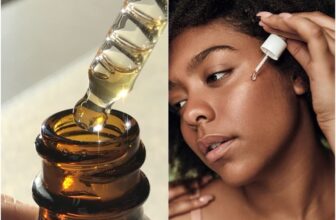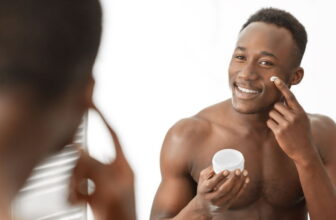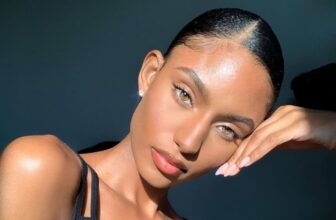Skincare Trends You’ll Need to Keep an Eye on in 2025
Skincare is no longer just about splashing water on your face and slapping on some moisturizer. It’s now more than that. Over the years, we’ve seen it evolve from basic routines to 10-step regimens, and now, in 2025, it will be all about finding that sweet spot between science, sustainability, and self-care.
The 2025 skincare trends reflect a shift in how we think about our skin. It’s no longer about keeping up with unrealistic ideals or overcomplicated regimens. Instead, the focus has moved toward mindful practices, sustainable choices, and solutions backed by cutting-edge technology.
 Photo: Ebonybomani
Photo: Ebonybomani These 2025 skincare trends blend science, nature, and inclusivity in ways that cater to modern lifestyles. Think AI-driven recommendations that take the guesswork out of choosing products, waterless formulas that pack a powerful punch while reducing waste, and gadgets that bring spa-level treatments right into your home. The skincare trends of 2025 promise to make skincare more effective, efficient, and enjoyable.
Ahead, we’ll dive into the details, exploring how these changes will reshape the beauty industry and transform routines into rituals that truly work.
The Rise of Skin Bacteria Love
In 2025, the skincare world will be buzzing about the microbiome—the trillions of bacteria, fungi, and microorganisms that live on your skin. These tiny organisms play a big role in keeping your skin healthy, yet they’ve often been overlooked in favor of harsh cleansers and exfoliators.
Next year, the microbiome-friendly skincare trend is taking the stage. As people become more conscious of wellness and the ingredients they use on their skin, they’re shifting toward products that protect, rather than strip, the skin. Studies and influencers are pushing the message of balancing the skin’s ecosystem instead of overwhelming it with products.
Products infused with probiotics (good bacteria) and prebiotics (food for those bacteria) are helping to balance your skin’s ecosystem. The goal? To strengthen your skin’s natural barrier, soothe inflammation, and even reduce acne without over-stripping or irritating your face.
Studies have increasingly highlighted the importance of the skin’s microbiome in maintaining healthy, balanced skin. For instance, brands like Tatcha and La Roche-Posay have already incorporated probiotics in their formulas. These products aim to strengthen the skin barrier and improve conditions like acne, eczema, and redness.
Tatcha’s The Rice Wash and La Roche-Posay’s products featuring Prebiotic Thermal Water are helping to boost the conversation on microbiome health, aligning with the trend’s rise.
Fermented ingredients like kombucha, rice water, and fermented ginseng are also making waves, offering gentle yet powerful solutions to common skin concerns. This 2025 skincare trend is a reminder that sometimes, the best way to care for your skin is to let it do its thing—with a little help from science.
Waterless Skincare
Water is a precious resource, and the beauty industry is taking notice. In 2025, the waterless skincare trend is becoming more than just a niche movement; it’s a full-blown revolution.
In recent years, there has been an undeniable push for sustainability in the beauty industry. Brands like Lush, Ethique, and Superzero have pioneered waterless beauty products, with increasing consumer interest due to their eco-friendly and waste-reducing properties. By late 2024, more mainstream brands such as L’Oréal and Garnier began announcing waterless or low-water product lines, signaling that this movement is no longer limited to niche players.
These brands skip water as a filler and instead focus on concentrated formulas packed with active ingredients.
From solid cleansers to powdered serums, waterless skincare delivers powerful results while reducing environmental impact. It’s not just about sustainability—it’s also about potency. Without water, active ingredients stay more stable and deliver more noticeable effects, making these products a win-win for your skin and the planet.
Skinimalism: Less Is Finally More
The skincare aisle can be overwhelming, with endless options promising miraculous results. But in 2025, simplicity will be the main focus.
Research by market analysts like Mintel and McKinsey highlights a growing preference for minimalist beauty routines, especially among Gen Z and Millennials, who prioritize time-saving solutions and efficacy over excess.
Consumers are increasingly conscious of environmental impact. A streamlined routine using multipurpose products reduces waste, aligning with sustainability goals. Brands like Glow Recipe and Versed have already embraced this, launching products that multitask and minimize packaging.
Skin minimalism encourages us to strip down our routines, focusing on fewer, high-quality products that multitask and deliver results.
 Photo: instagram/emmanuellek_
Photo: instagram/emmanuellek_ Think cleansers that double as moisturizers or serums that protect against pollution and blue light while hydrating your skin. This minimalist 2025 skincare trend will help reduce irritation, cut costs, and create routines that are easy to stick with. After all, less truly is more when it comes to healthy, happy skin.
Beauty Tech for the Win
Skincare gadgets are no longer a luxury, they’re becoming staples in everyday routines. This shift is backed by growing consumer interest and a surge in product innovation. In 2025, at-home devices like LED masks, microcurrent tools, and ultrasonic cleansers are making professional-level treatments accessible to everyone.
According to market research, the global at-home beauty devices market is expected to grow significantly, projected to reach over USD 14.8 billion by 2031. This surge reflects increasing consumer demand for convenient, cost-effective alternatives to salon treatments.
High-profile influencers and celebrities, including Hailey Bieber and Jessica Alba, have popularized the use of LED masks and microcurrent tools in their skincare routines, sparking widespread interest.
LED masks help reduce acne and boost collagen with light therapy while microcurrent tools tighten and tone the skin with gentle electrical currents. These gadgets are easy to use and deliver noticeable results, making them a must-try for anyone looking to transform their skincare routine without breaking the bank.
Personalized Skincare
Next year, personalization is taking over the skincare world. Brands are moving away from generic categories like “oily” or “dry” and instead focusing on creating products tailored to individual needs.
DNA analysis kits, virtual consultations, and custom-blended serums are just a few examples of how personalization is changing the game.
Companies like Proven Skincare and Curology have introduced DNA analysis kits and AI-powered virtual consultations to offer products tailored to your skin’s unique needs.
Proven’s AI platform, for instance, uses a database of over 28 million consumer reviews to create personalized formulas while Curology customizes prescription creams based on photos of your skin and a quiz.
By understanding your unique skin type and concerns, these solutions offer routines that work better and faster. It’s a skincare trend that finally feels made for you—because it is.
Blue Light Protection
We live in a world dominated by screens, and our skin is paying the price. Blue light from phones, laptops, and even LED lights can accelerate aging, cause hyperpigmentation, and weaken the skin barrier.
In 2025, skincare products are fighting back. Sunscreens, serums, and face mists infused with blue light blockers and antioxidants are helping to protect against digital damage.
Major skincare brands are already addressing this concern. L’Oréal and Shiseido have introduced products infused with blue light-blocking ingredients, such as niacinamide and antioxidants, which are designed to counteract the oxidative stress caused by prolonged screen exposure. These launches are being heavily marketed, and their success has influenced competitors to follow suit.
These products are a must-have for anyone who spends long hours in front of screens, offering peace of mind and healthier skin.
Anti-Aging Goes Next-Level
The anti-aging industry is evolving with smarter, more effective solutions. Peptides, growth factors, and stem cell extracts are leading the charge, offering non-invasive ways to stimulate collagen and repair damage. Studies published in journals like Dermatology Times show peptides and growth factors effectively stimulate collagen production and repair damaged skin.
Topical alternatives to Botox, like products with Argireline, are gaining popularity for their ability to smooth wrinkles without needles. According to Google Trends data, searches for “Argireline products” have risen steadily over the past two years, indicating growing consumer curiosity and adoption.
These skincare trends make anti-aging more accessible and less intimidating, proving that you don’t need drastic measures to achieve youthful skin.
Inclusivity in Skincare
In 2025, the industry is finally embracing diversity in a meaningful way. From sunscreens that don’t leave a white cast on dark skin to products addressing unique concerns like hyperpigmentation in melanated skin, inclusivity will no longer be optional—it’s becoming the standard.
Fenty Beauty revolutionized the beauty industry with its inclusive shade ranges, sparking a wave of diverse product launches. Similarly, brands like Topicals and Undefined Beauty focus on concerns specific to melanated skin, such as hyperpigmentation and discoloration.
 Photo: Erin Yamagata
Photo: Erin Yamagata Gender-neutral products and solutions for every stage of life are also gaining traction, ensuring that everyone feels represented and cared for in the world of skincare.
A Nielsen report highlighted that multicultural consumers drive beauty purchases, particularly products tailored to their needs. This demand signals a shift toward inclusivity becoming non-negotiable.
AI-Powered Skincare
Technology is reshaping every aspect of our lives, and skincare is no exception. In 2025, artificial intelligence will become the ultimate skincare expert. The industry is already making significant strides toward this future.
Brands like L’Oréal and Neutrogena have already introduced AI-powered tools, such as skin scanners and personalized product recommendations. For instance, L’Oréal’s Perso device analyzes skin conditions and dispenses customized skincare and makeup, while Neutrogena’s Skin360 app uses a smartphone camera to assess hydration and skin texture.
Recent studies reveal that more consumers are seeking personalized solutions. According to a McKinsey report, 71% of beauty consumers want tailored products and services. The rise of apps like Skin Advisor by Olay, which uses AI to suggest products, shows the growing acceptance of these technologies.
The global beauty tech market is projected to grow by over $10 billion by 2025 (Grand View Research). This growth is fueled by advancements in AI, augmented reality, and big data analytics, allowing brands to meet the demand for hyper-personalized skincare.
For the first time, skincare trends can be as dynamic as your skin itself. No more wasted money on products that don’t work or confusion over conflicting advice. With AI-powered skincare, you get tailored solutions designed to meet your skin’s specific needs, whether it’s combating dryness in the winter or tackling sun damage in the summer.
Photo: LaylaBird/Getty Images
You May Also Like:
Sodium Ascorbyl Phosphate For Skin: What You Need to Know
January 19, 202625 Best Skincare Products For Men
January 15, 2026Your Ultimate Guide to Achieving a Natural No-Makeup Makeup Look
December 30, 20257 Best Makeup Removers to Keep Your Holiday Glam Fresh
December 23, 2025Brow Grooming: An In-Depth Guide to Maintaining Healthy Brows
December 18, 2025Best Anti-Aging Products: Your Guide to Younger-Looking Skin
November 21, 2025Meghan Markle Goes Makeup Free On The Cover Harper's Bazaar magazine
November 20, 2025The Best Foundation for Natural Skin
November 13, 2025How to Remove Makeup Without Damaging Your Skin
November 12, 2025Skincare Myths You Should Stop Believing in 2026
November 12, 202510 Best Skin Brightening Serums for Radiant and Healthy Skin
September 26, 2025The Makeup Trends You Need to Know from NYFW Spring 2026
September 23, 2025Esther Ejoh is a Fashion Editor at Fashion Police Nigeria, where she writes all things fashion, beauty, and celebrity style, with a sharp eye and an even sharper pen. She’s the girl who’ll break down a Met Gala look one minute, rave about a Nigerian beauty brand the next, and still find time to binge a movie or get lost in a novel. Style, storytelling, and self-care? That’s her holy trinity.





